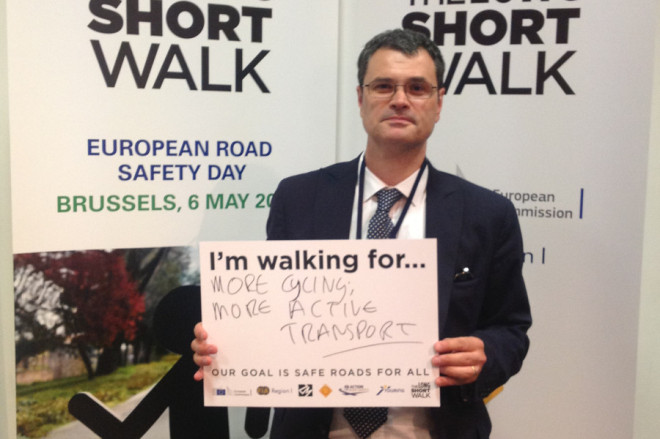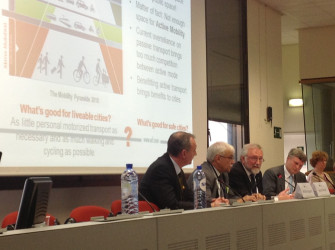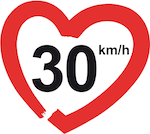
ECF brings 30K speed limits and active mobility on the agenda of the European Road Safety Day
 Speed and road safety remain hot topics in Europe as experts gathered in Brussels for the 5th European Road Safety Day this week. On top of the agenda: Pedestrian safety and the European Citizen’s Initiative for a 30 km/h speed limit in urban areas.
Speed and road safety remain hot topics in Europe as experts gathered in Brussels for the 5th European Road Safety Day this week. On top of the agenda: Pedestrian safety and the European Citizen’s Initiative for a 30 km/h speed limit in urban areas.
ECF’s president Manfred Neun was part of the panel of experts addressing the risks for vulnerable road users. “We must not have a two class society”, Manfred Neun said. ”Public space should be for all, and therefore more active mobility is good for the further development of our democratic societies.” Active mobility also means cycling, as Manfred underlined. “Cycling will be at the forefront of this development.”
Manfred Neun was joined by Jeannot Mersch, President of the European Road Victims Association (FEVR) and Jacob Bansgaard of the International Automobile Federation (FIA). Both agreed that cities should be adapted to accommodate the so called vulnerable road users. “The urban space should be a hierarchy following the degree of vulnerability”, Mersch said. “In a well-adapted social system the strongest and most experienced takes care on the weakest.”
Geert van Waeg , President of the International Federation of Pedestrian stressed that pedestrian safety needs a global effort by urban planners. “People should feel safe everywhere in urban areas not just on pedestrian crossings,” says Waeg. His is the vision of a city’s roads as part of the public domain, “where people meet and interact.”
A consensus amongst EU officials on the benefits of 30K speed limits inside urban areas
The European Commission and its Director of Sustainable Mobility in DG MOVE (Mobility department of the European Commission), Olivier Onidi, also stressed the fact that protecting the most vulnerable road users has to be a priority for urban mobility planners.
The Commission has indeed been feeling some pressure recently concerning road safety, as the conference was marked by the ongoing campaign for the European Citizen’s initiative to limit speed in urban areas to 30km/h. If the initiative manages to collect 1 million signatures, the Commission will be forced by law to consider taking legal action to limit speed to 30kph.
Isabelle Durant, Vice President of the European Parliament went even further, calling for the rights of vulnerable road users to be enshrined in law.
The European Citizen Initiative: sign here for 30K as default speed limit in cities.
You already have signed? Make one friend sign then
ECF has supported such people-centered approaches to urban road safety and mobility for a long time. Technical solutions, while important, can not solve the lack of access to urban areas for active modes of transport. They are still given priority over modal shift to active means of transport as long as people see the latter as risky and uncomfortable. This week’s conference showed signs of policy makers moving away from purely technical solutions.
Officials go for a walk
After the conference the particpants were, led by the Commission’s Vice President Siim Kallas and Mattias Ruete, Director of DG MOVE, able to get a first hand experience of what it’s like to be a pedestrian as the conference ended with a ‘long short walk’ towards the Parc Cinquantenaire. Many such walks take place around the globe during the UN global initiative to bring attention to pedestrians injured or killed. There are some encouraging signs that in Europe, at least, we can turn this plight into a serious political agenda.
You can find the presentations of the day here: http://ec.europa.eu/transport/road_safety/events-archive/2013_05_06_ersd_en.htm
 About the Author
About the Author
Ceri Woolsgrove is the ECF Policy Officer for Road Safety & Technical Issues. He is from the UK and has worked extensively in London, Brighton, Liverpool (UK), Hang Zhou (China) and now in Brussels. His previous employment was for an organisation representing the transport industry in Brussels. Ceri has a Master’s degree in Globalization and International Policy Analysis from the University of Bath, and Social and Political Thought from the University of Sussex
- Log in to post comments
Contact the author
Recent news!
Upcoming events
Contact Us
Avenue des Arts, 7-8
Postal address: Rue de la Charité, 22
1210 Brussels, Belgium











